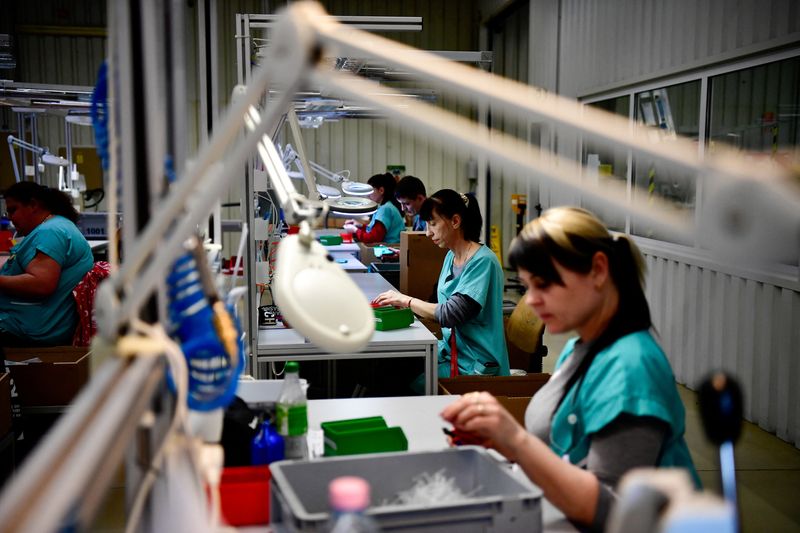By Gergely Szakacs, Jason Hovet and Maria Martinez
BUDAPEST/PRAGUE (Reuters) - The sickly state of the German economy is the next big challenge for the export-reliant countries of central Europe, which are still recovering from some of the world's worst inflation spikes in the wake of the COVID-19 pandemic.
Close trade ties with Germany and its once-mighty auto sector were for years a boon for the region since the collapse of communism. But now those ties risk becoming a drag on the economies of Hungary, Czech Republic and Slovakia.
Already, some local companies reliant on ties with Germany are trying to tap deeper into other overseas markets and branch into industries like defence to mitigate the weakness of their large western neighbour, where another year of near-recession looms.
However such efforts come at a time of major geo-political uncertainties, with the Ukraine war, Middle East conflict and rising protectionism. Despite the push into the defence sector, all of these factors could hamper the efforts of the region's companies.
"Economic disruption in the region's most important trade partner, and persistent weakness in the auto sector, pose additional risks of economic setback to the CEE region," said Dawn Holland, Director, Economic Research at Moody's (NYSE:MCO) Analytics.
Central Europe's inflation surge, led by eye-watering levels at 25% in Hungary last year, has prompted central banks to lift borrowing costs to their highest in two decades, with Czechs enduring the most sustained fall in real wages, now spanning eight successive quarters.
German companies had annual turnover of some 250 billion euros ($270 billion) in central Europe in 2021, employing about 1 million people directly and many more through suppliers, according to Germany's Bundesbank.
The Czech Republic and Hungary rely on Germany for a third and a quarter of their exports respectively, with Slovakia sending a fifth of its exports there based on a tally by S&P Global. Poland is seen less exposed because of the strength of its more diversified domestic economy, with its exports less dependent on car manufacturing.
The best scenario for most companies interviewed by Reuters would be stagnation in turnover this year, though some did not rule out an outright decline in revenue and possible job cuts.
Building on feedback from clients, Hungary's DGA Gepgyarto es Automatizalasi Kft, which makes steel structures, welded components and custom manufactured machinery, had been planning a 50% capacity expansion to meet the expected growth in demand over three years from 2023 to 2025.
"This (higher) demand had evaporated," Tamas Tornai, Executive Director of the holding company that controls DGA told Reuters. Even so, DGA is going ahead with its 2.5 billion forint ($6.95 million) expansion to serve the booming defence industry.
WIPED OUT
Germany's car sector is not only struggling with weak sales in its U.S. and European markets but obstacles ranging from high energy prices to the global shift to e-mobility that is forcing a rethink of the future of internal combustion engines.
Within central Europe, Hungary has led a charge in attracting investments in battery and electric car manufacturing from China, positioning itself as a meeting point for Eastern and Western investors.
"There is a very strong decline in car sector demand, caused by inflation, interest rates and economic uncertainty, which nearly wiped out private buyers from the market," said Tamas Mogyorosi, Business Development Manager at Alap Group.
He said the company, which provides quality management and other services for car sector, aerospace and electronics industry clients, tried to make up for a decline in western European markets by ramping up orders from Asian clients.
Otto Danek, vice-chairman of the Czech Exporters' Association, said the sector has seen a sharp cooling since the second half of 2023 due to the weakness in Germany.
"A relatively small drop in demand from this territory has a significant impact on the entire export segment," said Danek, who owns Atas Elektromotory Nachod, a company making small electric motors.
"We are looking for new markets, more so in Europe ... but such a shortfall cannot be replaced in half a year."
Agrikon KAM, which makes components for agricultural machinery, serving mostly German clients, projects a 10% fall in revenue in 2024, which could lead to a 5% to 10% fall in its headcount by the middle of the year. It says a possible rise in sales to the U.S. will not fully offset the weakness in Europe.
Rating agencies say that weakness could complicate efforts to rein in budget deficits, which S&P Global says will remain "exceptionally wide" in historical terms for the region this year.
"The more protracted weakness in Germany is one of the top risks we see for CEE," said Karen Vartapetov, Director, Lead Analyst for CEE & CIS Sovereign Ratings at S&P Global.
"It could weigh on medium-term growth in CEE and further undermine what already appear to be challenging fiscal consolidation plans."

($1 = 0.9241 euros)
($1 = 359.56 forints)